Purdue ANS participates in Lugar Collegiate Energy Summit
 On September 17, the Purdue University American Nuclear Society Student Section (Purdue ANS) participated in the 2nd Annual Lugar Collegiate Energy Summit at the Indianapolis Museum of Art. Fifteen Purdue ANS members were among the 200 participants at this informative summit focused on the energy challenges facing the nation and energy security. Students attended workshops to learn how to run successful community programs about energy issues. Sen. Richard Lugar (R.,Ind.) gave a speech on energy options, and Purdue ANS members challenged him with questions about nuclear energy options.
On September 17, the Purdue University American Nuclear Society Student Section (Purdue ANS) participated in the 2nd Annual Lugar Collegiate Energy Summit at the Indianapolis Museum of Art. Fifteen Purdue ANS members were among the 200 participants at this informative summit focused on the energy challenges facing the nation and energy security. Students attended workshops to learn how to run successful community programs about energy issues. Sen. Richard Lugar (R.,Ind.) gave a speech on energy options, and Purdue ANS members challenged him with questions about nuclear energy options.

-3 2x1.jpg)
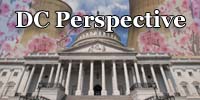 Over the next 25 years, the demand for electricity in the United States is expected to rise by 30 percent. This is a trend that will almost certainly accelerate as we move increasingly toward an electricity-based transportation infrastructure and plug-in hybrids and we replace fossil fuels. In fact, as the lead Republican sponsor of the
Over the next 25 years, the demand for electricity in the United States is expected to rise by 30 percent. This is a trend that will almost certainly accelerate as we move increasingly toward an electricity-based transportation infrastructure and plug-in hybrids and we replace fossil fuels. In fact, as the lead Republican sponsor of the  The 24th Carnival of Nuclear Energy Blogs is up at
The 24th Carnival of Nuclear Energy Blogs is up at 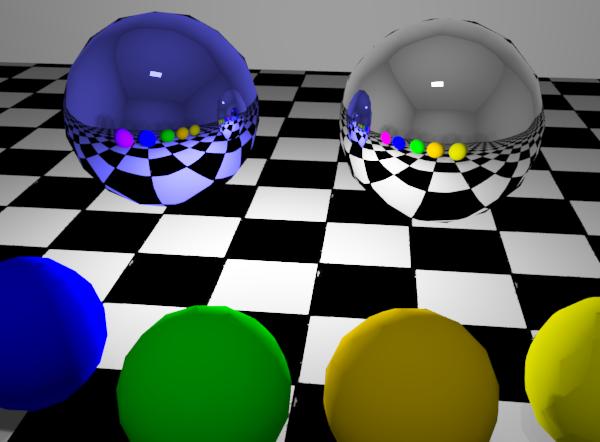 In July 2010 a software worm, which is malevolent computer code, appeared on the radar screen of cyber security firms when it was found to be targeting computers in Iran and several other countries running industrial control systems.
In July 2010 a software worm, which is malevolent computer code, appeared on the radar screen of cyber security firms when it was found to be targeting computers in Iran and several other countries running industrial control systems. Fall is in the air! The temperatures are cool-the leaves are turning-and (after a childhood filled with repeated disappointment and utter futility) I get to watch my Philadelphia Phillies make their mark on another MLB post-season.
Fall is in the air! The temperatures are cool-the leaves are turning-and (after a childhood filled with repeated disappointment and utter futility) I get to watch my Philadelphia Phillies make their mark on another MLB post-season.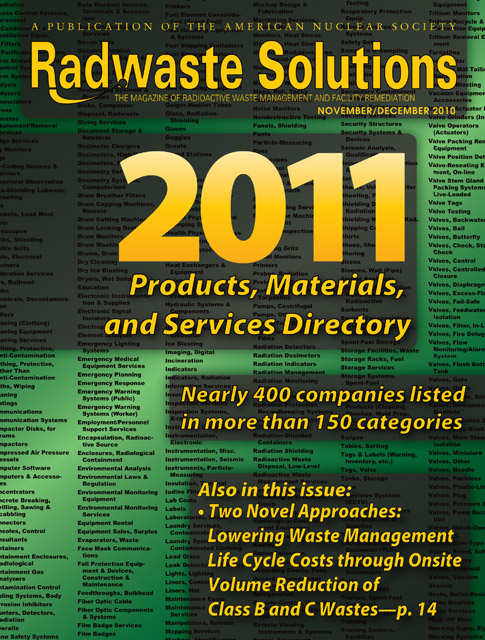 The November/December issue of Radwaste Solutions will soon be available electronically to ANS members. This issue includes the fifth annual Buyers Guide, which is a directory of companies that provide products or services that relate directly to work at Department of Energy cleanup and remediation sites and civilian decommissioning projects, as well as to radioactive waste management in both the utility and specialized nonpower/nongovernment segments of the nuclear industry. This year's Buyers Guide includes information on nearly 400 companies listed in more than 150 categories.
The November/December issue of Radwaste Solutions will soon be available electronically to ANS members. This issue includes the fifth annual Buyers Guide, which is a directory of companies that provide products or services that relate directly to work at Department of Energy cleanup and remediation sites and civilian decommissioning projects, as well as to radioactive waste management in both the utility and specialized nonpower/nongovernment segments of the nuclear industry. This year's Buyers Guide includes information on nearly 400 companies listed in more than 150 categories.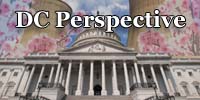 Now that more comprehensive climate change policies such as cap-and-trade are on indefinite hold, the U.S. Congress is considering a national Renewable Energy Standard (RES) in an effort to do something on energy issues. The RES would require that 15 percent of all U.S. electrical generation be provided by "renewable" sources by 2020. Currently, the definition of "renewable energy" does not include nuclear. Similar policies are already in place in many states, such as California.
Now that more comprehensive climate change policies such as cap-and-trade are on indefinite hold, the U.S. Congress is considering a national Renewable Energy Standard (RES) in an effort to do something on energy issues. The RES would require that 15 percent of all U.S. electrical generation be provided by "renewable" sources by 2020. Currently, the definition of "renewable energy" does not include nuclear. Similar policies are already in place in many states, such as California.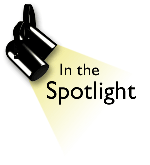 Clearly, our attempts to generate greater understanding of energy challenges exclude no member of the public. Young and old, Democrat and Republican, male and female-all must be the aim of public information about U.S. energy policy in general and nuclear energy in particular. Years of industry surveys, however, have quantified the large gender divide on acceptance of nuclear energy. For example, a survey last year by Ipsos Public Affairs showed that 54 percent of men support a stronger role for nuclear energy in the next few decades, while women's support was only 32 percent.
Clearly, our attempts to generate greater understanding of energy challenges exclude no member of the public. Young and old, Democrat and Republican, male and female-all must be the aim of public information about U.S. energy policy in general and nuclear energy in particular. Years of industry surveys, however, have quantified the large gender divide on acceptance of nuclear energy. For example, a survey last year by Ipsos Public Affairs showed that 54 percent of men support a stronger role for nuclear energy in the next few decades, while women's support was only 32 percent.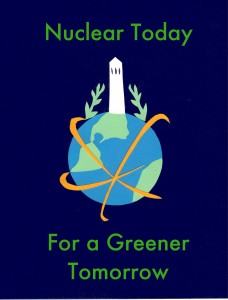 My generation has been labeled Generation X, or maybe Y, I'm not sure. I don't even know what those labels mean. I think of us as individuals coming of age in the Information Age. We have been exposed to more information than any generation before and have been made all too aware of the problems facing our planet from a very early age.
My generation has been labeled Generation X, or maybe Y, I'm not sure. I don't even know what those labels mean. I think of us as individuals coming of age in the Information Age. We have been exposed to more information than any generation before and have been made all too aware of the problems facing our planet from a very early age.